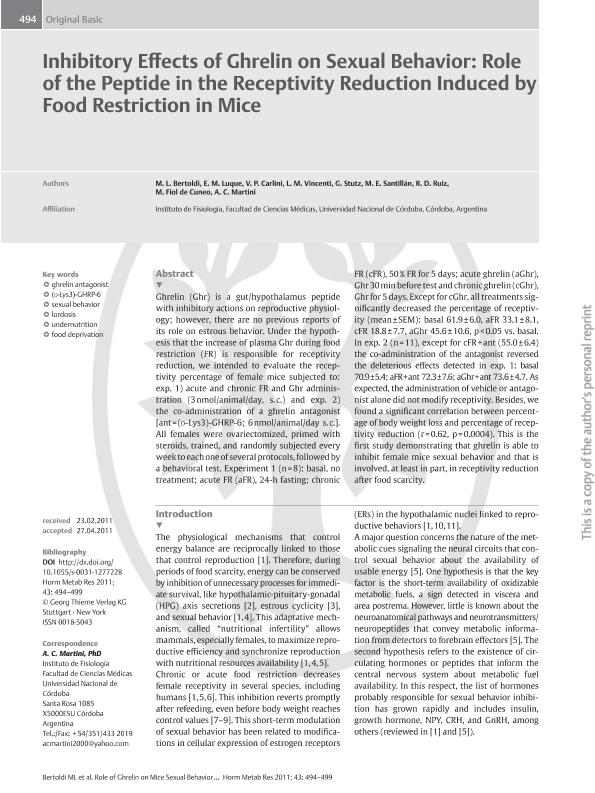Artículo
Inhibitory effects of ghrelin on sexual behavior: Role of the peptide in the receptivity reduction induced by food restriction in mice
Bertoldi, María Laura ; Luque, E. M.; Carlini, Valeria Paola
; Luque, E. M.; Carlini, Valeria Paola ; Vincenti, Laura María; Stutz, Graciela; Santillán, M.E.; Ruiz, R. D.; Fiol de Cuneo, Marta; Martini, Ana Carolina
; Vincenti, Laura María; Stutz, Graciela; Santillán, M.E.; Ruiz, R. D.; Fiol de Cuneo, Marta; Martini, Ana Carolina
 ; Luque, E. M.; Carlini, Valeria Paola
; Luque, E. M.; Carlini, Valeria Paola ; Vincenti, Laura María; Stutz, Graciela; Santillán, M.E.; Ruiz, R. D.; Fiol de Cuneo, Marta; Martini, Ana Carolina
; Vincenti, Laura María; Stutz, Graciela; Santillán, M.E.; Ruiz, R. D.; Fiol de Cuneo, Marta; Martini, Ana Carolina
Fecha de publicación:
04/2011
Editorial:
Georg Thieme Verlagiaorl@iaorl.org
Revista:
Hormone and Metabolic Research
ISSN:
0018-5043
e-ISSN:
1439-4286
Idioma:
Inglés
Tipo de recurso:
Artículo publicado
Clasificación temática:
Resumen
Ghrelin (Ghr) is a gut/hypothalamus peptide with inhibitory actions on reproductive physiology; however, there are no previous reports of its role on estrous behavior. Under the hypothesis that the increase of plasma Ghr during food restriction (FR) is responsible for receptivity reduction, we intended to evaluate the receptivity percentage of female mice subjected to: exp. 1) acute and chronic FR and Ghr administration (3 nmol/animal/day, s. c.) and exp. 2) the co-administration of a ghrelin antagonist [ant=(d-Lys3)-GHRP-6; 6 nmol/animal/day s. c.]. All females were ovariectomized, primed with steroids, trained, and randomly subjected every week to each one of several protocols, followed by a behavioral test. Experiment 1 (n=8): basal, no treatment; acute FR (aFR), 24-h fasting; chronic FR (cFR), 50% FR for 5 days; acute ghrelin (aGhr), Ghr 30 min before test and chronic ghrelin (cGhr), Ghr for 5 days. Except for cGhr, all treatments significantly decreased the percentage of receptivity (mean±SEM): basal 61.9±6.0, aFR 33.1±8.1, cFR 18.8±7.7, aGhr 45.6±10.6, p<0.05 vs. basal. In exp. 2 (n=11), except for cFR+ant (55.0±6.4) the co-administration of the antagonist reversed the deleterious effects detected in exp. 1: basal 70.9±5.4; aFR+ant 72.3±7.6; aGhr+ant 73.6±4.7. As expected, the administration of vehicle or antagonist alone did not modify receptivity. Besides, we found a significant correlation between percentage of body weight loss and percentage of receptivity reduction (r=0.62, p=0.0004). This is the first study demonstrating that ghrelin is able to inhibit female mice sexual behavior and that is involved, at least in part, in receptivity reduction after food scarcity.
Palabras clave:
GRHELIN ANTAGONIST
,
(D-LYS3)-GHRP6
,
SEXUAL BEHAVIOR
Archivos asociados
Licencia
Identificadores
Colecciones
Articulos(CIQUIBIC)
Articulos de CENTRO DE INVEST.EN QCA.BIOL.DE CORDOBA (P)
Articulos de CENTRO DE INVEST.EN QCA.BIOL.DE CORDOBA (P)
Articulos(INICSA)
Articulos de INSTITUTO DE INVESTIGACIONES EN CIENCIAS DE LA SALUD
Articulos de INSTITUTO DE INVESTIGACIONES EN CIENCIAS DE LA SALUD
Citación
Bertoldi, María Laura; Luque, E. M.; Carlini, Valeria Paola; Vincenti, Laura María; Stutz, Graciela; et al.; Inhibitory effects of ghrelin on sexual behavior: Role of the peptide in the receptivity reduction induced by food restriction in mice; Georg Thieme Verlagiaorl@iaorl.org; Hormone and Metabolic Research; 43; 7; 4-2011; 494-499
Compartir
Altmétricas



